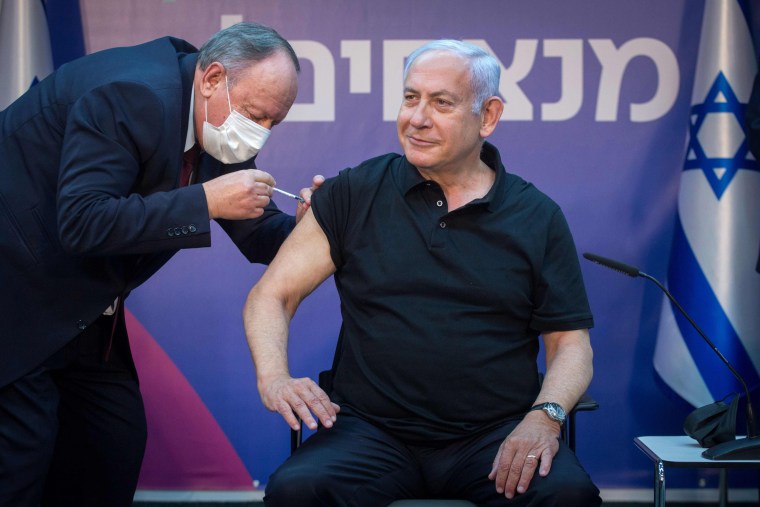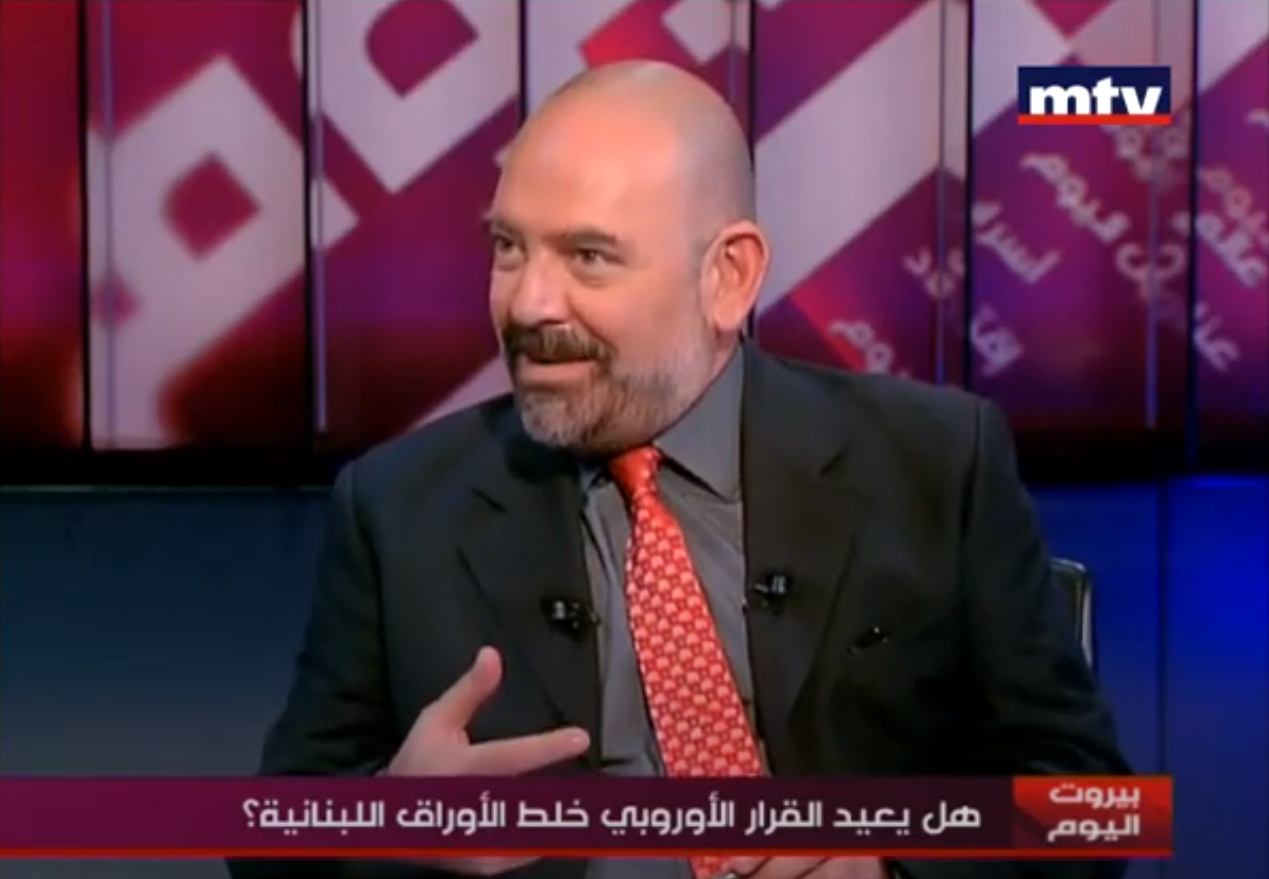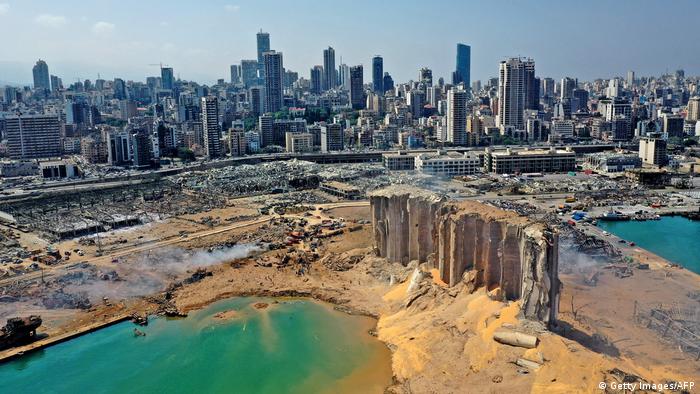by naharnet.com — Maronite Patriarch Beshara al-Rahi on Sunday called for organizing a U.N.-sponsored international conference on Lebanon. “The collapsed situation of Lebanon — which according to the constitution is a founding member of the Arab League and a founding member of the U.N. — requires that its cause be raised in an international conference […]

By Yardena Schwartz — nbcnews.com — — As Israel outpaces Western nations in its Covid-19 vaccination effort, it has become a role model for a world aching to return to life as it once was. The country has inoculated a third of its population of 9 million in little more than a month, and over 80 percent of those 60 and older. But if you ask most Israelis, the country’s handling of the coronavirus has been anything but a success story. A recent poll by the nonpartisan Israel Democracy Institute found that just 24 percent of Israelis approve of the government’s management of the crisis. While Israel boasts the world’s highest vaccination rate, it is also battling the world’s third-worst infection rate. Despite the vaccination campaign, January was Israel’s deadliest month, with 1,433 people dying from the virus — a third of the 5,000 fatalities since the pandemic began. Israelis have also experienced some of the world’s strictest and longest national lockdowns, with residents mostly confined to their homes for a cumulative four months.

The Good Friend of the French Nation
“Glory and Justice for the defense of the faith”
Article written at L’estafette, 27th December 1889 (newspaper) Reference: https://www.retronews.fr/journal/l-estafette-1876-1914/27-decembre-1889/1101/3685127/2 (translated in English)
Among the distinguished foreigners who came to Paris to visit the Exhibition was a Maronite prince, Emir Hassen-el-Khazen (Hosun el Khazen), whose family has always stood out for his work in France. In the seventeenth century, the services rendered to our country by one of his ancestors, Naufal-el-Khazen, earned him a distinction from Louis XIV. France had only one consulate in Saida for the whole of Syria; the king created a new one in Beirut and entrusted it to Naufal-el-Khazen. This dignity remained in the family until the French Revolution, when the consulate was abolished. By the time he was reinstated by Napoleon I, the family’s representative was too young to get the post, and when he later asked for it, the Ottoman government intervened to prevent his appointment. The members of the family continued to put at the service of France all their wealth and influence, founding schools and fighting, for certain years especially, against the extension of Italian influence.
In this they merely obeyed the wishes of their foregoing, Naufal-el-Khazen, in the will of which is this very significant sentence: \”I declare that if, by misfortune, someone of mine comes to forget France, I deny it and be deprived of his heritage!\” The current prince carries with him multiple family papers, royal letters, diplomatic papers, received by his family under the reigns of Louis XIV, Louis XV and Louis XVI. These papers, documents and gifts were examined by the head of the archives division at the Ministry of Foreign Affairs, Mr. Minister of Plenipoten-Tiaire Girard de Rialle, and certified authentic. We have noted in the statements in these documents some expressions used at that time in our diplomacy and not very known of the current public. In the letters addressed to Naufal-el-Khazen, he is called a Magnificent lord, Prince of Maronite of Mount Lebanon and consul of the \”French nation\”. The King of France is always called our diplomatic agents \”the emperor our august master.\”

Opinion by Danielle Pletka and Michael Rubin Danielle Pletka – washingtonpost.com — – Fear is the secret weapon of tyrants — but it is also their greatest weakness. Lokman Slim, who knew no fear, was kryptonite to Lebanese Hezbollah. Slim founded Hayya Bina (Let’s Go), an anti-Hezbollah organization. For decades, he shrugged off Hezbollah threats. He campaigned tirelessly in neighborhoods dominated by Hezbollah against the group’s efforts to subvert Lebanese democracy and to subordinate Lebanese national interests to Iran’s. He was found dead on Thursday, shot repeatedly in the head and back. Although Hezbollah released a statement condemning the killing, within Hezbollah circles there was a hint of celebration. Jawad Nasrallah, son of Hezbollah Secretary General Hassan Nasrallah, tweeted (and later deleted), “Loss of some is in reality an unexpected gain and kindness for others. #NoSorrow.” Others took to Slim’s Facebook page to celebrate his slaying, rejoicing that Hezbollah “took out the trash.”
In Slim’s death, we see a microcosm of what Lebanon has become. What was once the Paris of the Middle East has become a snuff film of a country, every hero meeting his death at the hands of the true powers that reign in Beirut. In the 1970s, it was Palestinian terror subjugating Lebanon. Then Syrians. In the 1980s, Israel plowed north and then south, trampling its enemies. Iran moved in at the same time, its Revolutionary Guard Corps building the group that would become the true bane of the Lebanese people, Hezbollah. Turkey now waits in the wings, especially in northern Lebanon. Every person who has stood up to these interlopers has met an untimely end — Prime Minister Rafiq al-Hariri most famously, Slim most recently. In 2005, in the wake of Lebanon’s Cedar Revolution, Slim joined a diverse group of Arab reformers in a project to debate a democratic future for their countries. The following year, he presented his thoughts about how to counter Hezbollah corruption at a conference at our think tank, the American Enterprise Institute. In a subsequent AEI essay, he wrote, “Until Lebanese intellectuals are willing to draw a line in the sand and not allow Hezbollah and other hired thugs to define the debate, there is little hope for real dissent and reform.”

By By CHYRINE MEZHER — breakingdefense.com — BEIRUT: In this exclusive interview, the commander of the Lebanese Air Force, Brig. Gen. Ziad Haykal, tells Breaking D about the current strategies adopted to boost Lebanon’s ISR capabilities, the challenges encountered along the way and the Air Force’s plans for the future. Three Phase Plan:
Recently, the Army Command developed a strategic plan aiming at boosting the country’s aerial reconnaissance capabilities to the highest level possible for its land and naval border regiments, with the goal of surveilling the land and sea borders and curbing illegal activities, while also protecting gas platforms in the future. “This came on the heels of devoting our aerial reconnaissance capabilities to monitoring activities and movements of terrorists on the northern and northeastern borders, throughout the years of 2009 and until 2017 — which happened to be the end of “Fajr al-Joroud” Operation,” he explained. Back in August 2017, the Lebanese Army launched Operation Fajr al-Joroud — Dawn of the Outskirts — against Daesh (ISIS) positions on the outskirts of al-Qaa and Ras Baalbek towns, killing 35 militants in the process as they sought to eradicate the last vestiges of militant threats to national security. Divided into three stages, the plan links reconnaissance aircraft of all kinds with functional cutting operations rooms on one hand, and the army, air force and navy command operations rooms on the other. “This facilitates the decision-making process by increasing the awareness of activities around the target,” he said.

By NAJIA AL-HOUSSARI & TAREK ALI AHMAD — BEIRUT/LONDON: Lebanese author and activist Luqman Slim, 59, was found dead on Thursday morning in the southern region of Zahrani. His killing was the first of a Lebanese Shiite anti-Hezbollah figure since 2004. News of Slim’s disappearance broke on Thursday morning after nothing was heard from him on Wednesday evening after he started travelling home from visiting family in the southern village of Niha. Rasha Al-Ameer, Slim’s sister, announced his disappearance on social media, asking for information to help recover him. But in the early hours of Thursday morning, the news changed from a missing person to an assassination after Slim’s body was found in his car in one of the orchards of the Al-Adousiya area. “We are demanding a thorough investigation which should determine the motive behind the killing and hold the perpetrators accountable,” Sherif Mansour, the MENA Program Coordinator for the Committee to Protect Journalists, told Arab News. “The bottom line is that censorship including against critical journalists by fractions within Lebanon should not go unpunished and what we hope to see is that Hezbollah, especially because of their prior threats, will be questioned and pressured to provide answers.” “In terms of censorship, we hope that the various Lebanese authorities would respect any media institution that has worked to cover not just this issue but others that are currently facing censorship by Hezbollah affiliates in Lebanon so that they can continue to operate without harassment or retaliation.”
A protester holds a picture of Luqman Slim, who has been found dead in his car, during a protest in front of the Justice Palace in Beirut on Feb. 4, 2021. (AP) Forensic doctor Afif Khafaja said that “the body was hit with five bullets, four in the head and one in the back,” which is an uncommon method of assassination. No identification cards were found on the body. Slim’s family used a mobile application to locate his cell phone, which was found tossed in one of the orchards near the house he was at in Niha. His killing is the culmination of a series of threats Slim has received for many years — which intensified in recent months — for his strong anti-Hezbollah stance. He was accused by Hezbollah and its members of being an “Israeli agent” or “a Shiite of the American Embassy.” The activist chose not to hide in his home in the region of Ghobeiry despite the threats he had received, refusing to let intimidation prevent him from publishing his ideas. Threats were sent through flyers that were thrown into his garden and read “muffler” and “Hezbollah is the nation’s honor.”

by reliefweb.int — Over half a million children are at risk of child labour and child marriage as their families struggle six months on from the Beirut blast, World Vision warns today. The explosion, which killed more than 200 people on August 4 last year, compounded a crisis in Lebanon which had already been exacerbated by COVID-19. In Beirut schools are closed, many health facilities are inaccessible, running water is scarce and with lockdown, many people cannot work. World Vision estimates that 541,000 children are therefore at risk of early marriage and being forced into labour as parents struggle to put food on the table. The number of children and caregivers reporting mental health concerns is also on the rise, putting children at risk of long-term psychological challenges.
Rami Shamma, Operations Director at World Vision Lebanon, says: “Six months ago, families in Beirut who were already struggling to survive COVID-19 and an economic crisis were forced to deal with another catastrophe in the form of a devastating explosion. Six months later they have not recovered. In fact, things are worse for them. We call for international solidarity for the people of Lebanon, they are in no less of a crisis situation now than they were on August 4th,.” World Vision is urging the international community to invest in education and to prioritise child protection and mental health support for those struggling in the aftermath of the blast.
CAIRO – by egypttoday.com — After his meeting with President Abdel Fatah al-Sisi in Cairo early on Wednesday, Lebanese Acting Prime Minister Saad al-Hariri held talks with Minister of Foreign Affairs Sameh Shokry and Chief of General Intelligence Agency Abbas Kamel in the ministry’s headquarters. The Egyptian officials asserted Egypt’s fixed stance on supporting the security […]
(MENAFN – The Peninsula) BEIRUT: Lebanon is set to receive 500,000 tonnes of fuel oil from Iraq in 2021 for power generation, the Lebanese caretaker energy minister said on Wednesday. The Energy Ministry was also buying spot cargos of fuel and had received offers from several local and foreign companies, Raymond Ghajar told reporters. Lebanon’s […]
![The influential head of Lebanon's General Security apparatus, Abbas Ibrahim, is pictured during an interview at his office in the capital Beirut on July 22, 2020 [ANWAR AMRO/AFP via Getty Images]](https://i2.wp.com/www.middleeastmonitor.com/wp-content/uploads/2021/02/GettyImages-1228661941-scaled-e1612285499891.jpg?resize=1200%2C800&quality=85&strip=all&zoom=1&ssl=1)
by middleeastmonitor.com — Eight Lebanese detained in the United Arab Emirates landed in Beirut on Tuesday after Lebanon’s security chief said he had lobbied Abu Dhabi for their release. Abbas Ibrahim told Reuters the eight had been in UAE custody from a few months to up to seven years, including some who had completed their sentence. He said 15 people would return in total, and 15 others were expected to be released soon as well. This “came in the context of security files between Lebanon and the UAE which have been tackled”, he said. UAE authorities declined to comment.
Airport sources and Lebanese state media said eight people arrived on Tuesday. A Lebanese official familiar with the matter said their charges were all related to allegedly “dealing with Hezbollah indirectly or directly.” Gulf states, which once channelled funds into Lebanon, have grown wary in recent years, alarmed by the rising influence of the armed Shia Muslim Hezbollah movement which is backed by their arch-rival Iran.



